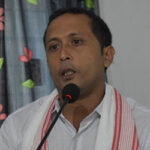The Department of Economics, HPB Girls’ College, Golaghat has come into existence in July, 1969.Since its inception, progressive achievement is made by the department in promoting the goals and objectives of the institution and as such the potential capabilities of women are being developed through education. To have education, one needs to be developed, to have a share in development one needs to have education. Economics is one of the most practical subjects of social science which is very much exciting and challenging within the context of major set of problems such as poverty, inequality, unemployment, population growth, environmental decay and rural stagnation to elucidate real world development problems through inclusion.
The department imparts education to its students with utmost care to make them capable of exploring newer and newer ideas and opportunities they face in their expanded range of choice of lives in a social system through their quality and competency. For that, Faculty members try to impart quality education and as such maintain quality and excellence in teaching, learning and evaluation and standard in performance within the professional competency of parameter of the college so that students could become knowledgeable and can develop deeper understanding of their own situation as acting human and can evaluate the questions of public policy. Human beings are born with certain potential capabilities. Our purpose is to create an environment in which all students can expand their capabilities and the range of choice for both present and future generation. Constant efforts are made for the employability of students and they are always encouraged to be well equipped with competence, knowledge and efficiency for the knowledge society they are facing. Students are also encouraged to be tempered with the spirit and social values of ethics, equity, inclusion, human security, sustainability and development.
Educational Qualification-M. A. (Dib. U) LL. B. (Dib. U) Ph. D. (AU) SLET
Specialization and Area of Interest- Econometrics & Mathematical Economics Food Security
Educational Qualification-M. A. (GU) Ph. D. (GU) NET
Specialization and Area of Interest- Econometrics & Mathematical Economics, Agrarian Structure and Relations.
Educational Qualification-M. A. (GU) M. Phil (UoH) Ph. D. (Dib. U) NET, SLET
Specialization and Area of Interest- Environmental Economics, Econometrics, Human Resource Development, Forest Resource Management
Educational Qualification-M. A. (Dib. U) M. Phil (Dib.U) NET
Specialization and Area of Interest- Mathematical Economics, Econometrics, Monetary Economics, International Trade, Development Economics
| Sl No. | Course Name | Course Code | Issue Addressed |
| 1 | Introductory Microeconomics | ECNHC101 |
|
| 2 | Mathematical Methods for Economics-I | ECNHC102 |
|
| 3 | Introductory Microeconomics | GE1 |
|
| 4 | Introductory Macroeconomics | ECNHC201 |
|
| 5 | Mathematical Methods for Economics-II | ECNHC202 |
|
| 6 | Introductory Macroeconomics | GE2 |
|
| 7 | Essentials of Micro Economics | ECNHC 301 |
|
| 8 | Essentials of Macro Economics | ECNHC 302 |
|
| 9 | Statistical Methods for Economics | ECNHC 303 |
|
| 10 | Indian Economy-I | ECNGE 3.1 |
|
| 11 | Advanced Microeconomics | ECNHC 401 |
|
| 12 | Advanced Macroeconomics | ECNHC 402 |
|
| 13 | Introductory Econometrics | ECNHC 403 |
|
| 14 | Public Finance | ECNGE 4.3 |
|
| 15 | Development Economics With Indian Perspective-I | ECOM501 |
|
| 16 | Public Economics: Policy Issues | ECOM502 |
|
| 17 | History of Economic Thought | ECOM503 |
|
| 18 | Monetary Theories and Financial Markets | ECOM504 |
|
| 19 | Development Economics With Indian Perspective-II | ECOM601 |
|
| 20 | Environmental Economics | ECOM602 |
|
| 21 | International Economics | ECOM603 |
|
| 22 | Economic Issues of Assam |
ECOM604
|
|





